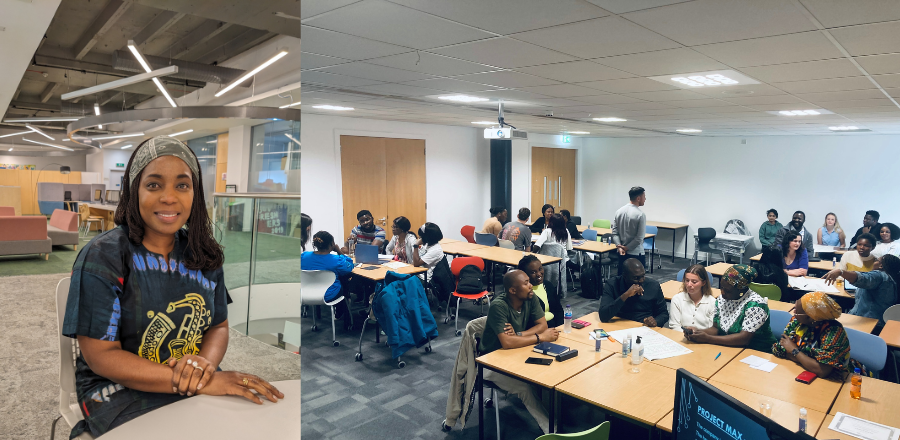Teamwork the key as students tackle topic of paternity leave

Students from across GCU’s Glasgow School for Business and Society (GSBS) recently got an insight into how to create change in the workplace.
30 students from a variety of different subject areas, including business, social innovation, and risk management, came together on the 6th of September to look at how organisations around the globe are adapting to the shifting attitudes around paternity leave.
Martha Abodunrin Adedayo, a second year MSc Risk Management student, was one of those involved. She said: “I’ve always wanted to be part of a workshop learning about situations in the workplace. It’s designed to help prepare us for leaving University and having to work with teams, so I saw it as a great opportunity. I’m also preparing to start an internship, so it has given me an insight into what structured organisations look like.”
The event, which took place on campus at GCU, involved human resources leaders and GCU Alumni Alan Wilson (Tarabut Gateway), and Kat Jones (Eden Springs).
Those involved were split into groups of five and asked to look at paternity leave from the perspective of three different countries: the United Kingdom, the United Arab Emirates, and Bahrain.
Martha said: “Usually we have ‘maternity leave’ but more organisations are now proposing ‘paternity leave’ where the fathers can get work-life balance and continue to be involved with their families. It was interesting to find out that it’s a topic that organisations around the world are beginning to address.
“The first thing we had to do was recognise the scope of the organisation and identify the stakeholders. This was important to look at in order to judge the impact of a new paternity leave policy.
“The most important thing was discussing the sustainability of the policy and if it could continue in the future. We also had to consider the demographic and the current statutory requirement of the different countries. In the UAE for example, the men are expected to provide for their family and there is no paternity leave there. In Bahrain, men only get five days paternity leave - only one of which is paid. In the UK, 90% of organisations pay for 1-2 weeks.”
Working with students from other programmes also allowed Martha to hear different perspectives from a variety of backgrounds.
“It was great because there was so much collaborative teamwork,’ she explained.
“Everyone brought their own ideas and that was definitely the fun part. We were given 90 minutes to come up with a solution and it was so interesting that we all had different ideas: we wrote things down, we agreed, we disagreed, and then we had to prepare the project’s presentation.
“Each group presented for 15 minutes, and we were able to pick-up something new from each group – I was sitting there like, ‘why didn’t I think of that!’.”
“At the end of it, Kat and Alan gave us feedback and told us there were certain things we need to consider in terms of the budget of organisations and whether or not paternity leave will be paid.
“Another interesting thing was one of the groups mentioning the challenges around integrating back into work after paternity leave and people potentially being worried about losing their jobs. A separate group then suggested organisations should carry out paternity check-ups and provide support to employees when they return to work. We also spoke about working from home and flexible hours for taking children to hospital.”
Martha added: “There wasn’t a perfect solution around paternity leave because it’s something that has to be discussed with stakeholders and employees. Whenever a new policy is introduced, there are bound to be people who would be against it, so the most important thing is keeping an open mind and letting everyone have their say. Without happy employees you will not have a happy organisation.”
Now in the final year of her degree, Martha believes the workshop came at the perfect time for her development as a young professional.
“It’s given me more confidence and made me realise I can do this as a career. Sometimes I doubt myself, but I think I really thrive working as part of a team because I pick up different things from other people to help tackle a bigger problem.”
By Ross Clark
Got an SHLS or GSBS story? Email me at Ross.Clark@gcu.ac.uk or message me on Twitter
